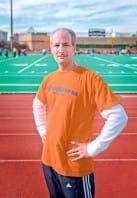Robert Herzog, WG’95, had already worked out and stopped to get his mail before jumping on the train that sunny morning. By chance, he caught a local train, instead of the express, which set him about five minutes behind schedule.
The slight delay saved his life.
Because a short while later, Herzog emerged from the subway and stepped out onto the plaza at the World Trade Center, just in time to see American Airlines Flight 11 crash into the North Tower’s 96th floor—the exact floor where his office was located.
Marsh and McLellan, a professional services and insurance brokerage, occupied eight floors—93 through 100—of the North Tower. That put the firm directly within the impact zone. Nearly 300 employees were killed, along with 60 consultants.
“A confluence of small coincidences had me arrive at the World Trade Center four or five minutes later than I would have been,” Herzog says. “Basically I arrived, came outside and saw the first plane directly hit my office.”
Some 900 other employees had stories just like his—stories of averting death, literally, by a matter of minutes. The ensuing days played out according to the terrible 9/11 script: the phone calls to locate colleagues, the efforts to recover data. Wondering: ‘What if?’
Fast forward a few months. Herzog was on vacation at the beach, puzzling over his life. He made a list of what had gone well, what had gone badly and what, really, he wanted to do with the rest of his life. As he struggled to figure out a new future, he recalled his days at Wharton—and first-year class on entrepreneurship.
“That’s when I had my first epiphany,” Herzog explained. “I realized I don’t need to be a banker or a consultant or a marketing person or whatever it is to have a successful career. I can go out and run my own business.”
So he did.
In 2001, he launched ZogSports, a co-ed, social sports club that promotes charity and social action. This year 80,000 young professionals in New York City, New Jersey, and Washington, DC were participating on ZogSports teams and the business behind it all employs 17 people. Herzog, who previously worked as a management consultant and entrepreneur, received no venture funding for the company, instead launching with his own savings soon after that post 9/11 vacation.
ZogSports’ first league—a flag football league—debuted in 2002. On opening day, 500 people showed up.
“It was time to quit my job,” Herzog says.
ZogSports has been so successful, Herzog believes, because the company is built on things he truly cares about. He had always been a sports nut as a kid—at age 8, he recalls creating a fantasy league based around his friends’ little-league teams—and remained a weekend warrior as an adult; he actually met his wife while playing in a recreational softball league. Through ZogSports, he hoped to provide opportunities to play sports for the pure joy of sport itself, without the feverish competitiveness of some leagues, and help young people in New York strike up new friendships.
But ZogSports isn’t just about sports. From the start, it was also about giving back to the community. It’s an element that can be traced directly to the 9/11 attacks. It was important, Herzog says, to make it easy for people to carry on the giving back part of the post 9/11 recovery. Charity and volunteering are part of the DNA of the company.
“We have integrated charity into how we do business,” he explains. “So we have some core values, and one of our core values is commitment to community. And we live commitment to community. We basically say three things: We give back. We help you give back. And we help you get more involved.”
The company donates a portion of all proceeds to charity and helps participants Play For Your Cause (the marketing tagline) through charitable donations to each winning team’s charity of choice. Partnerships, such as one with Modell’s Sporting Goods, assist in the company’s philanthropic efforts as well. Since ZogSports hit the field in 2002, the company and its players have donated some $1 million to charity.
Herzog added his first employee, VP of Operations Christie MacKinnon, about a year after the 2002 founding. The company grew fast until 2005, when Herzog’s first child was born. Then ZogSports hit a holding pattern while Herzog learned to be a dad. After the birth of his second child, the company took off again, growing 100 percent a year through 2009.
He’s enjoyed the company’s success, of course.
But the bottom line isn’t how he measures his life these days. Not anymore.
“The way I measure success is how much time I have to spend with my family,” he said. “It would be great if the business was five times the size and I made five times as much money. That’d be great, but I wouldn’t grow one penny if it was at the expense of being able to do the things that make me happy.”
What does make him happy?
Driving his kids to school three times a week. And coaching his son’s soccer team.

























